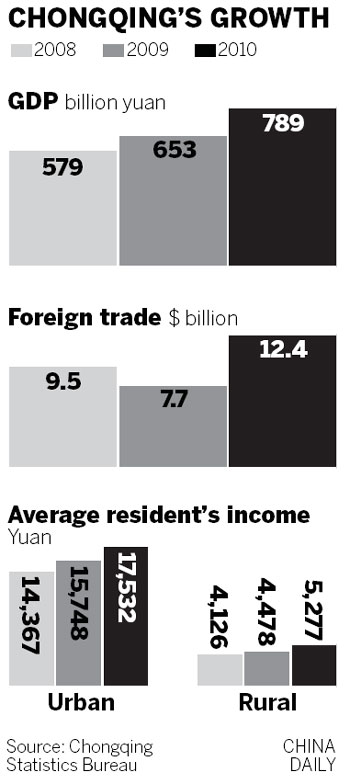Economy
Chongqing tax only on high-end housing
Updated: 2011-03-05 08:25
By property tax (China Daily)
BEIJING - Chongqing, one of the pilot cities for a property tax, promised on Friday that the tax will not apply to people on low incomes.

Huang Qifan, mayor of the Southwest China metropolis and a national legislator, said the city has decided to impose the tax on high-end housing only, which accounts for just 10 percent of the city's total.
Chongqing is charging a 1 percent tax on villas and apartments that are more than three times the average price. The rate rises to 1.2 percent if the houses are four times more expensive than the average, he said.
"For commercial houses and government-subsidized residential buildings of low-income residents, I believe it is unnecessary to impose a property tax - and we will not," Huang told a press conference.
The country has increased its efforts to tame the soaring property prices, introducing trial property taxes in Shanghai and Chongqing, and limiting the number of houses a person can buy in some cities.
Chongqing has also accelerated the building of public rental apartments for eligible families on a limited income to protect them from sky-high prices, Huang said.
Between 2010 and 2013, the city will build low-income public housing with a total area of 40 million square meters for residents in the city, including migrant workers, he said.
Meanwhile, the average income of urban residents in Chongqing hit 17,532 yuan ($2,700) in 2010, an 11.3-percent increase year-on-year, while the average income of rural residents grew by 13.4 percent to 5,277 yuan during the same period.
China Daily
E-paper

Sindberg leaves lasting legacy
China commemorates Danish hero's courage during Nanjing Massacres.
Crystal Clear
No more tears
Road to the Oscars
Specials

NPC & CPPCC sessions
Lawmakers and political advisers gather in Beijing to discuss major issues.

Sentimental journey
Prince William and Kate Middleton returned to the place where they met and fell in love.

Rent your own island
Zhejiang Province charts plans to lease coastal islands for private investments





